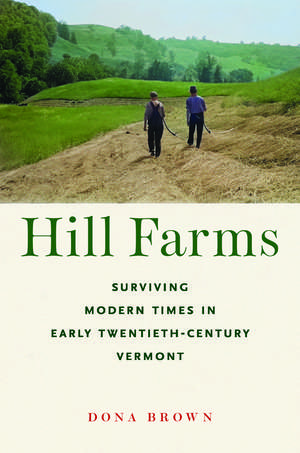Hill Farms: Surviving Modern Times in Early Twentieth-Century Vermont: Environmental History of the Northeast
Autor Dona Brownen Limba Engleză Paperback – 3 iul 2025
Brown examines the records of a 1930 study by the University of Vermont’s now infamous Eugenics Survey, part of a flood of problematic investigations of Vermont rural life at the time, wherein eugenicists interviewed residents in every Jamaica household about crops, incomes, and housing conditions. These researchers from various disciplines saw in Jamaica and towns like it poverty and ignorance rather than a commitment to farming as a modest but sustainable way of life. Extensive handwritten notes from the Eugenics Survey provide a remarkable glimpse into the daily lives and practices of these upland farmers, revealing the value in maintaining older, less intensive farming practices and shedding new light on the social and environmental history of the time. As debates around farming and rural life intensified during the Great Depression, advocates beyond Vermont rose to the defense of traditional farms. Though industrialized agriculture ultimately prevailed, the old farming strategies cultivated by these upcountry residents continue to attract adherents in the face of new challenges to traditional farming in our own times.
Preț: 238.41 lei
Nou
Puncte Express: 358
Preț estimativ în valută:
45.63€ • 49.59$ • 38.36£
45.63€ • 49.59$ • 38.36£
Carte nepublicată încă
Doresc să fiu notificat când acest titlu va fi disponibil:
Se trimite...
Preluare comenzi: 021 569.72.76
Specificații
ISBN-13: 9781625348722
ISBN-10: 162534872X
Pagini: 252
Ilustrații: 8
Dimensiuni: 152 x 229 mm
Greutate: 0.45 kg
Editura: University of Massachusetts Press
Colecția University of Massachusetts Press
Seria Environmental History of the Northeast
ISBN-10: 162534872X
Pagini: 252
Ilustrații: 8
Dimensiuni: 152 x 229 mm
Greutate: 0.45 kg
Editura: University of Massachusetts Press
Colecția University of Massachusetts Press
Seria Environmental History of the Northeast
Notă biografică
DONA BROWN is professor emerita of history at the University of Vermont. She is the author of Back to the Land: The Enduring Dream of Self-Sufficiency in Modern America and Inventing New England: Regional Tourism in the Nineteenth Century, and editor of A Tourist’s New England: Travel Fiction, 1820–1920. She has contributed essays to The Routledge History of Rural America, New England: A Landscape History, The Encyclopedia of New England Culture, and Picturing Old New England: Image and Memory. She has consulted on numerous museum exhibits, and has held a National Endowment for the Humanities Fellowship, at the Winterthur Museum, and the Frances Hiatt Fellowship at the American Antiquarian Society.
Cuprins
CONTENTS
List of Illustrations
Preface
Acknowledgments
Guide to Pseudonyms
Introduction
1. How Farming Came to Jamaica, and What it Became There
2. How Jamaica Became a Problem: The Experts in the Hills
3. The 1930 Eugenics Survey: A Diagnosis and a Proposed Solution
4. What Farming Really Meant
5. Standards of Living
6. Things Left Unsaid: Family, Community, Work
7. The Great Depression: The Problem Becomes a (Temporary) Solution
Epilogue: Returning to Jamaica
Notes
Index
List of Illustrations
Preface
Acknowledgments
Guide to Pseudonyms
Introduction
1. How Farming Came to Jamaica, and What it Became There
2. How Jamaica Became a Problem: The Experts in the Hills
3. The 1930 Eugenics Survey: A Diagnosis and a Proposed Solution
4. What Farming Really Meant
5. Standards of Living
6. Things Left Unsaid: Family, Community, Work
7. The Great Depression: The Problem Becomes a (Temporary) Solution
Epilogue: Returning to Jamaica
Notes
Index
Recenzii
“This is an impressive and polished work of scholarship. The depth and detail of the research in primary sources is particularly strong. The author’s deep empathy for these historical Jamaicans and commitment to the stories of Vermont’s hill farmers shines through.”—Kathryn Morse, author of The Nature of Gold: An Environmental History of the Klondike Gold Rush
“Brown frames this 1930 Eugenics Survey in Jamaica, Vermont, with the history of the state’s hill farming, while reading through the eugenics team’s own problematic notes to get at the world view of the hill farmers themselves. She nicely ties this story into the scholarly literature on 20th century modernization of agriculture and rural life, and then into the back-to-the-land movement through to the next generation of regenerative farmers going at it today. Brown’s writing is deft and knowing as she tells this fascinating story, adding humorous asides.”—Brian Donahue, author of The Great Meadow: Farmers and the Land in Colonial Concord
“Brown frames this 1930 Eugenics Survey in Jamaica, Vermont, with the history of the state’s hill farming, while reading through the eugenics team’s own problematic notes to get at the world view of the hill farmers themselves. She nicely ties this story into the scholarly literature on 20th century modernization of agriculture and rural life, and then into the back-to-the-land movement through to the next generation of regenerative farmers going at it today. Brown’s writing is deft and knowing as she tells this fascinating story, adding humorous asides.”—Brian Donahue, author of The Great Meadow: Farmers and the Land in Colonial Concord











